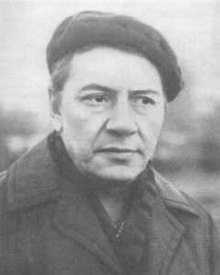Viktor Nekipelov
| Viktor Alexandrovich Nekipelov | |
|---|---|
 |
|
| Native name | Виктор Александрович Некипелов |
| Born |
September 29, 1928 Harbin, China |
| Died | July 1, 1989 (aged 60) Paris, France |
| Nationality | Russian |
| Citizenship |
|
| Alma mater | Kharkiv Medical Institute, Maxim Gorky Literature Institute |
| Occupation | medicine, pharmacy, literature, poetry |
| Organization | Moscow Helsinki Group |
| Known for | human rights activism |
| Movement | dissident movement in the Soviet Union |
| Criminal charge | 1st term: spreading of known false fabrications that is damaging the Soviet political system (Article 190-1 of the RSFSR Criminal Code), 2nd term: Anti-Soviet agitation and propaganda (Article 70 of the RSFSR Criminal Code) |
| Criminal penalty | two years in a labour camp (1st term), seven years in a labour camp and five years in internal exile (2nd term) |
| Spouse(s) | Nina Komarova |
| Awards | |
Viktor Aleksandrovich Nekipelov (Russian: Ви́ктор Алекса́ндрович Некипе́лов, 29 September 1928 in Harbin, China – 1 July 1989 in Paris) was a Russian poet, writer,Soviet dissident, member of the Moscow Helsinki Group. He spent about nine years in prison for his participation in the Moscow Helsinki Group.
Nekipelov was born to a Soviet family of workers of the Chinese Eastern Railway. In 1937, he and his mother came to the Soviet Union. In 1939, his mother was arrested and died in imprisonment. He left a high school in Omsk. From 1947 to 1950, he studied at the Omsk Army Medical School. In 1950, he left the Omsk Army Medical School with honours. In 1960, he graduated from the army medical faculty of the Kharkiv Medical Institute with honours as well. In 1969, he graduated from an extramural faculty of the Moscow Literature Institute. He worked as a pharmacist.
In 1973, he was arrested for "spreading of known false fabrications that is damaging the Soviet political system" (Article 190-1 of the RSFSR Criminal Code). According to Sakharov's letter to Gorbachev of 19 February 1986, Nekipelov was convicted for his philosophical verses that were considered defamatory by a court. Nekipelov was sent to the Section 4 of the Serbsky Institute of Forensic Psychiatry for psychiatric evaluation, which lasted from 15 January to 12 March 1974, was judged sane (which he was), tried, and sentenced to two years' imprisonment. In 1976, he published in samizdat his book Institute of Fools: Notes on the Serbsky Institute based on his personal experience at Psychiatric Hospital of the Serbsky Institute and translated into English in 1980.
...
Wikipedia
